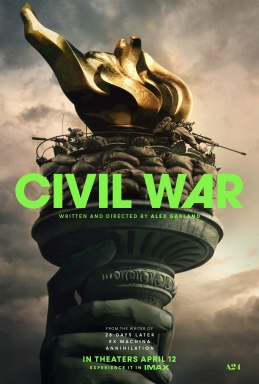With the current American political atmosphere as unsteady as it is currently, it was a matter of time before someone decided to capitalize off it. Alex Garland’s “Civil War” has done just that, creating a striking parody film mocking the current U.S. political atmosphere.
The film follows a group of journalists as they travel across a dystopian, almost apocalyptic United States in which a second Civil War has erupted due to the authoritarian overreach of the federal government. The group is trying to reach Washington, D.C., before the city falls to the allied Western Forces (“W.F.”) of California and Texas. The movie is an entertaining speculative film and a warning of one of the core values the U.S. is based on; “unity in diversity”.
While the film delivers most of its impact via images of war-torn American countryside reminiscent of current armed altercations, the main thing that got me about it was the depth of the characters. I’ve seen more than a few films and done enough writing to know just how difficult creating deep, detailed characters for the audience can be. This film nailed it; the main character, renowned war photographer Lee Smith (played by Kirsten Dunst), genuinely caught my attention as a tough, hardened photojournalist struggling with PTSD and guilt concerning the things she’s seen.
The main cast wasn’t very large, and they didn’t have very established backstories; but through the film, they showed remarkable character development and that, in turn, revealed who they were. I genuinely cared about these characters; a major part of the film is the company of aspiring photographer Jessie Cullen (Cailee Spaeny), who admits that Smith is a huge role model for her. Smith, in turn, initially dislikes her and berates fellow journalists Sammy (Stephen McKinley Henderson) and Joel (Wagner Moura) for allowing her to travel with them. Over the course of the film, Smith helps Cullen hone her skills, realizing her potential as she does so, and the two begin to bond.
At the end of the film, Smith is shot while shielding Cullen from gunfire as the W.F. lay siege to the White House. Cullen takes a photo of her death, and to me, this represented far more than a dark ending to an already dark film; it represented the passing of time, and how the torch of responsibility is pass on through generations. Sammy’s main reasoning for letting Cullen accompany them was that she was the future, and that she needed experience. In the end, she takes the place of her mentor, and continues on with Joel to interview the President before he is killed.
The atmosphere of the film itself was great. I love post-apocalyptic fiction, and especially films about the beginnings of the apocalypse. The one thing I wish this film could have done more of was establishing more background to the revolution, and explaining why parts of the country were attempting to succeed. The film hints at it, (explaining that the President is in his third term), but mainly leaves it up for debate.
Overall, I thought that it was a thoughtful movie with an interesting take on a somewhat common trope; the downfall of the United States in its own version of the paradox of tolerance.

